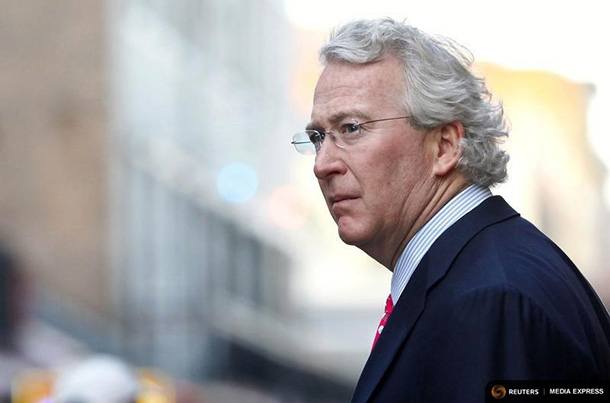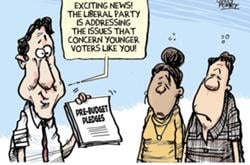"I think most people act in their self-interest." -- Aubrey McClendon
On Wednesday, March 2, Aubrey McClendon, the American face of hydraulic fracking, drove his natural-gas powered Chevy Tahoe into a concrete overpass just outside Oklahoma City. He was 56.
According to the Tahoe's black box data recorder, McClendon had the accelerator floored until 1.5 seconds before the crash. He didn't brake in the final 9 metres before impact. McClendon wasn't wearing a seat belt, police reported.
But it wouldn't have mattered. His Tahoe hit the overpass at 126 kilometres an hour, the front end crumpled and it burst into a fireball. McClendon died instantly.
McClendon's life ended at 9 a.m. on a sunny morning, after what had been a very bad day for McClendon, who the U.S. business press had called the "Shale King" and "America's most reckless billionaire."
His main backer for new fracking ventures in Argentina backed out, saying he had no more cash to loan the overleveraged entrepreneur.
And McClendon -- also known as the "Fracking Cowboy" -- learned that the U.S. Department of Justice had indicted him for allegedly conspiring to suppress land prices in Oklahoma by rigging bids while he was still CEO of Chesapeake Energy, the company he co-founded in 1989.
McClendon had been removed as Chesapeake board chair in 2012 as a result of shareholder discontent. He was pushed out as CEO a year later over financial irregularities.
The new bid-rigging charges weren't surprising. McClendon had faced similar allegations in Michigan, where Chesapeake and Calgary-based Encana Corp. paid big fines for plotting to drive down rural land prices.
The day before McClendon drove his Tahoe into the overpass, he called the new charges "wrong and unprecedented."
McClendon said he had been "singled out as the only person in the oil and gas industry in over 110 years since the Sherman Antitrust Act became law to have been accused of this crime in relation to joint bidding on leasehold."
"Anyone who knows me, my business record and the industry in which I have worked for 35 years, knows that I could not be guilty of violating any antitrust laws," his statement said. "All my life I have worked to create jobs in Oklahoma, grow its economy, and to provide abundant and affordable energy to all Americans... I will fight to prove my innocence and to clear my name."
'Living the American dream long enough to meet its sister nightmare'
McClendon always thought the secret to success in life was to have a short memory and thick skin. At least until he drove his Tahoe into a wall.
His controversial rise in the fracking world and his violent end mirrored the volatile and often destructive character of the North American shale gas gamble. He symbolized the excesses of the shale gas industry and its brute force accomplice, hydraulic fracturing.
The high-energy, optimistic entrepreneur gambled everything in the bust-and-boom casino of unconventional, high-risk hydrocarbons. For a short time, he outran the looming realities of a growing debt load, bad land deals and an underperforming technology.
But ultimately, debt -- all that money borrowed for risky shale gas gambles -- threw the former accountant and landman into the middle of a Shakespearean tragedy with the usual ingredients of ambition, greed and waste.
McClendon lived the American dream long enough to encounter its sister nightmare. He seized an opportunity, conquered nature and gained and lost a fortune.
As a history major, McClendon probably knew the fates of others who bet all on a resource boom. But like so many driven energy CEOs, he embraced risk like a moth to the flame.
His personal and corporate life exposed the contradictions in the industry. Big-spending, high risks and lavish lifestyles abounded, the expression of everything antithetical to conservative values. Yet the industry serves as the most persistent funder of the political right in North America.
In his excellent book on the shale revolution, The Boom, journalist Russell Gold described McClendon aptly – "part pied piper, part early adopter, and part rapacious capitalist."
McClendon came from a blue-blood Oklahoma family. His great uncle, Robert Kerr, was governor of that unique petro state in the 1940s and was also one of the founders of Kerr-McGee, the energy giant bought by Anadarko for $16.5 billion in 2006.
McClendon married into blue blood too. His wife, Katie, was the granddaughter of Frederick Upton, a founder of the Whirlpool, one of the world's largest appliance makers. One of Katie's cousins chaired the energy and commerce committee in the House of Representatives. Another relative, Kate Upton, made millions as a model and Internet sensation.
McClendon first worked as a landman after graduating from Duke University in 1981, where he listened to Bruce Springsteen, majored in history (he later collected antique cars and maps) and minored in accounting.
Using his charm and inquisitiveness, the loquacious McClendon negotiated with landowners to gain access to their property to drill wells. He didn't know much about geology, but he knew how to read people and had a flair for deal-making. He was, in short, a consummate American salesman, with a handsome open face, curly hair and ready smile.
McClendon's insight: Fracking 'changes everything'
McClendon knew that booms and busts dominated the industry. His career was just beginning when the spectacular crash in oil prices of the early 1980s slammed petro states from Alberta to Oklahoma.
The streets of his hometown, Oklahoma City, looked like a mall parking lot at 3 a.m. Oil industry debt and unpaid bills pulled down local banks and flattened housing markets.
But McClendon thought he could ride the next boom and handle any busts with easy-to-get borrowed money.
With a friend, Tom Ward, he started Chesapeake Energy in 1989. McClendon reasoned that if the company failed, it would be best not to have his name on it. That proved to be prescient. The company struggled for a decade.
In the 1990s, investors sued McClendon and a colleague for fixing land deals. The court found them guilty of misleading investors by exaggerating what they had actually paid for land leases and overstating reserves. They paid $1.25 million in punitive damages.
In 1998, McClendon even tried to unload the struggling company, but there were no takers.
But as the shale gas revolution started to take off in 2002, McClendon saw opportunity. He realized that buying drilling rights for huge areas and using fracking to crack open previously uneconomic shale rocks could pay off. Utility companies were switching from coal to natural gas to generate electricity, and demand was rising.
"Nobody could imagine that from rock that has almost no permeability you could get gas to flow in commercial amounts," McClendon told Fortune magazine in 2008. "We weren't the first to unlock those secrets, but we were among the first to recognize that if it works it changes everything."
McClendon understood fracking -- the injection of liquids under high pressure to crack poor-grade hydrocarbon rocks and release trapped gas -- wasn't about technology. It was as an old-fashioned real estate gamble and land grab. The guy with the largest kingdom to frack would get the most gas to market.
Between 2000 and 2006, McClendon went on a real estate binge. He borrowed billions to acquire drilling rights on more than 45,000 square kilometres in Texas, Louisiana, Arkansas, West Virginia and Pennsylvania. The company hired more than 5,000 landmen to plant the Chesapeake flag across the country. McClendon often made more money flipping real estate to competitors than he did extracting gas.
McClendon saw easy credit as one of the most important tools for cashing in on shale gas. "To be able to borrow money for 10 years and ride out boom-and-bust cycles was almost as important an insight as horizontal drilling," McClendon told Rolling Stone magazine in 2012. "If something didn't work for a little bit of time, we could regroup and find something that did work."
Wine cellars, NBA teams and the billionaire lifestyle
In 2008, just before the price of methane tanked, Fortune magazine referred to McClendon as "Mr. Gas." His personal wealth totalled about $3 billion. Chesapeake, trading at 75 cents a decade earlier, was now valued at $50 a share. The brash McClendon thought the price was still too low.
McClendon revelled in the success, and spent like a pharaoh. He amassed one of the world's largest wine collections (100,000 bottles). He bought the NBA's Seattle SuperSonics and moved the team to his home state, changing the name to the Oklahoma City Thunder. He donated to community causes.
Chesapeake's 50-acre headquarters resembled a happy Silicon Valley campus. There were aerobic classes, a swimming pool and soccer field, and three restaurants. The company's health centre offered teeth whitening and Botox injections. McClendon said you had to offer "amenities" to employees to keep them.
"I think our community, our state, our country, and our world need us to be successful," McClendon told Chesapeake employees in 2008. "We're doing things that nobody else in the world is doing. Drilling wells that other people wouldn't have. We've made discoveries that other people would never have found. When I wake up in the morning I'm ready to go because I get to work for a company that drilled more rock than anybody else on Earth... "
The borrow-and-spend strategy worked as long as natural gas prices were above $10 per million British thermal units, enough to cover the high cost of fracking and horizontal drilling.
But methane prices collapsed in the 2008 global recession. Chesapeake shares lost almost 80 per cent of their value. The company's board of directors, however, gave McClendon a big raise and other perks.
Realizing that gas supply might soon outstrip demand, McClendon became a tireless evangelist for methane as "clean energy," even though scientists still regard it as one of the world's most potent greenhouse gases.
McClendon attacked coal companies with big newspaper ads and courted environmentalists. Between 2007 and 2010, he donated almost $25 million to the Sierra Club to help fund its Beyond Coal campaign.
Within short order, Sierra Club executive director Carl Pope was trumpeting fracked natural gas as a climate-change fighter, even as farmlands were taken over by energy companies and communities across the U.S. dealt with the incessant traffic of fracking trucks, flaring and groundwater pollution.
McClendon's sweet talk and millions got the Sierra Club to temporarily ignore emerging science on chronic methane leakage from wellbores and to break the first rule of advocacy -- don't take from industries and companies you're trying to change.
When not tempting green NGOs with dollars, McClendon donated millions to right-wing political groups including Progress for America Voter Fund, Swift Boat Veterans for Truth, Republican State Leadership Committee, Club for Growth and Americans United to Preserve Marriage.
But his real focus was on selling fracking. And he was good at it.
McClendon, the salesman, called people who opposed the technology "modern day Luddites."
McClendon defended the controversial and unpredictable technology, which can trigger earthquakes and foul groundwater, until the day he died. Like most of the industry's CEOS, he claimed fracking was safe and proven technology.
In 2012 McClendon told Rolling Stone that environmentalists were just angry that fracking had brought new shale gas production and lower natural gas prices. That weakened environmentalists' arguments for their pet green energy projects, he said.
"If you believe in a world where the wind and the sun are going to produce all our power in the future, then we've disrupted that vision of the world," he said. "On the other hand, if you dream of a world where air is cleaner, where energy is half the price it was before and we're not exporting a million dollars a minute to OPEC or having to go fight wars in Afghanistan and Iraq, then you should embrace natural gas."
The fracking bubble just about to burst
But McClendon had bigger problems. Methane prices never really recovered from the 2008 crash. Easy credit had encouraged frackers to expand so quickly that there was an oversupply, keeping prices low. To survive, McClendon mortgaged more and more of what he owned.
By 2010, high-profile Houston geologist Art Berman was predicting the shale gas bubble was about to pop. The former Amoco geologist said the industry was over-leveraged, over-hyped and bound for a stiff market correction. Shale formations were being rapidly depleted and methane prices often didn't cover production costs. The party was over.
McClendon had his own problems. A 2012 Reuters investigation discovered that McClendon had bought a personal share in every Chesapeake well and used those interests to secure over $1 billion in personal loans. He also operated a $200-million hedge fund from inside Chesapeake's offices. Following the revelations the company's stock fell like a rock.
The board ousted McClendon as chair and ended the program that let the company founders buy a personal 2.5-per-cent stake in every well. He stayed on as CEO.
Berman saw Chesapeake's problems and McClendon's growing debt as symbols of the sector's problems.
"But what it tells us is that this whole shale gas adventure is just not profitable" he said. "Here's a guy who is invested in all of Chesapeake's wells and he -- I can't remember the exact numbers -- but he lost something like $60 or $70 million in 2009 and he lost more than $100 million in 2010 and he'll probably lose even more than that in 2011. So right there, it's just a barometer that tells you, how profitable are Chesapeake's wells? Well, why does McClendon have to borrow to cover his losses if they're profitable? They're not profitable. That's the takeaway. It's real simple."
McClendon was typically dismissive, calling Berman "a third-tier geologist who considers himself a reservoir engineer."
It's "ludicrous" to think Berman might know more about shale gas "than companies that have combined market caps of almost $2 trillion and have spent hundreds of billions of dollars to develop these new resources," McClendon said.
But Berman was right.
McClendon's woes multiplied. He was pushed out as Chesapeake's CEO in 2013, then America's second largest gas extractor. The company he co-founded even sued him later, claiming McClendon had taken maps of Ohio gas reserves with him after being ousted as CEO. He settled out of court.
McClendon immediately started his own company, American Energy Partners. The ever-optimistic fracker talked lenders into pouring billions into his plans to frack Australia and Argentina.
Environmental problems, low prices and too much gas
Meanwhile, Chesapeake had its own problems. In 2015, the New York-based Natural Resources Defense Council published a report on "Fracking's Most Wanted."
The report looked at data from the three states -- out of 36 states with active oil and gas drilling -- that published public regulatory data identifying company environmental infractions. Chesapeake had the most offences in the organization's list of 10 companies, and was ranked as the number one offender in Pennsylvania, Colorado and West Virginia.
In Pennsylvania alone authorities issued Chesapeake 589 violations between 2009 and 2013. In one case, the company failed to properly case and cement gas wells. As a result methane contaminated drinking water for 16 families.
In West Virginia, the company paid fines of $6.5 million in 2013 for clogging and impounding streams and wetlands without a federal permit.
And Arkansas residents battled Chesapeake and BHP Billiton after their waste-injection wells caused a swarm of earthquakes between 2010 and 2011. Chesapeake settled out of court for an undisclosed sum.
In the end, even a short memory and a thick skin could not save McClendon and other frackers from an oversupply of gas and a financial collapse that brought plunging prices.
Just prior to McClendon's death, several firms that championed fracking with almost his level of enthusiasm posted multi-billion losses. Apache lost $23 billion last year; Chesapeake lost $14 billion.
In his sales pitches, McClendon promised that shale gas would reinvigorate America, provide an affordable alternative and guarantee 100 years of supply. But in reality the shale revolution delivered rapid depletion, poor recovery, volatile economics and massive methane leaks.
After learning about McClendon's death, Russell Gold, senior energy reporter for the Wall Street Journal, noted that big gamblers are called whales in Las Vegas.
"Aubrey McClendon was a whale in energy. You know, he started Chesapeake as sort of a two-man partnership in 1989. He built it up and then drove it very close to bankruptcy. Then he brought it all the way back and created this billion-dollar company between 2004 and 2011 drilled more wells than any other company in the world. And then he pretty much wrecked that, too. He did everything to an extreme."
Just like the shale gas industry. ![]()
Read more: Energy, Rights + Justice

















Tyee Commenting Guidelines
Comments that violate guidelines risk being deleted, and violations may result in a temporary or permanent user ban. Maintain the spirit of good conversation to stay in the discussion.
*Please note The Tyee is not a forum for spreading misinformation about COVID-19, denying its existence or minimizing its risk to public health.
Do:
Do not: